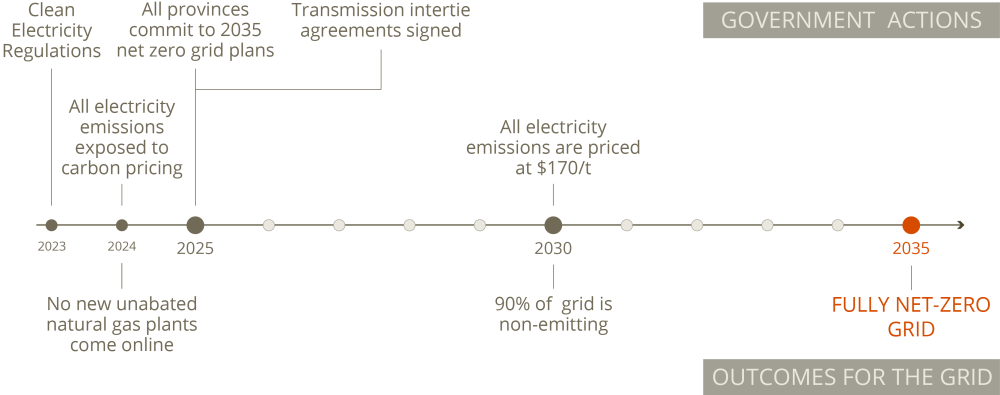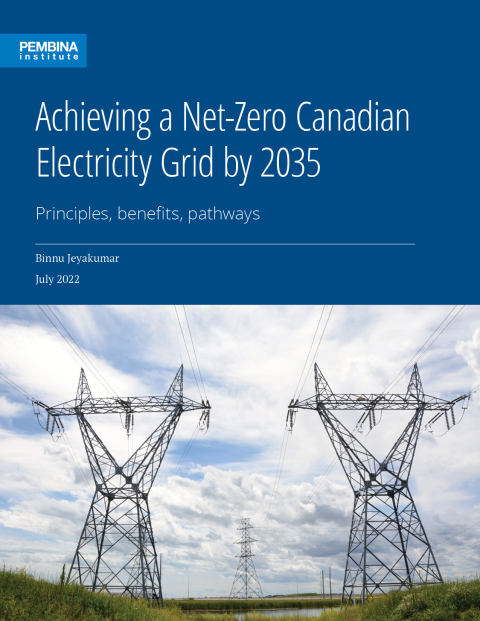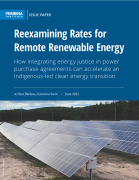The Government of Canada has committed that, by 2035, the country’s electricity grid will produce net-zero greenhouse gas emissions. This document sets out the Pembina Institute’s understanding of what constitutes a net-zero grid; the environmental, economic and social benefits net-zero electricity can offer to Canadians; and some of the key milestones that must be met by governments and industry to facilitate the creation of a truly net-zero grid by 2035.
If Canada achieves this objective, it will have a significant and enduring downward impact on the carbon footprints of all Canadians, and allow Canada to position itself as an international leader in clean electricity.
“Net”: how can emissions in the grid be negated?
A net-zero grid can allow for some flexibility through the use of offsets (“netting”) to negate any limited emissions from an otherwise clean grid. Offsets must be additional, verifiable, permanent, and avoid unintended negative consequences. The use of offsets in the electricity sector should be limited and should be nearly eliminated past 2035.
“Zero”: what does generation supply look like in a net-zero grid?
A net-zero grid has to be primarily based on renewable energy, supplemented by other non-polluting solutions such as transmission interties and demand-side measures. There may be grids in some parts of Canada where there may be a limited role for emitting technologies (but only where those emissions are fully offset or captured).
“Grid”: what generating facilities constitute the electricity system?
To create a truly net-zero grid that is recognized as such by investors, Canadians and the global community, there cannot be broad, undue exemptions that result in loopholes for certain generators. As such, all generation that is connected to an interconnected electricity system must be net-zero emissions. That includes behind-the-fence generation, even in cases where a majority of the energy generated is also consumed behind the fence.
Why is a net-zero grid by 2035 crucial for Canadians?
Achieving a net-zero electricity grid will provide environmental, social and economic benefits for Canada and Canadians. These benefits include improvements to:
Reliability and resilience
Diversifying the generation mix, investing in energy efficiency, modernizing the grid, and enabling demand-side management will improve grid flexibility and reliability.
Affordability
Pembina Institute analyses have found that a clean energy portfolio consisting of renewables, storage, energy efficiency and demand-side management can be cheaper than gas-fired generation, while providing the same energy services. Decoupling Canada’s grid from emitting forms of generation, such as gas-fired power, also helps to shield consumers from the price volatility of an electricity grid that is tied to global fossil fuel markets.
Jobs and economic development
While jobs in the traditional energy sector will decline, research indicates that job growth in the clean energy economy will outpace those losses. Between 2020 and 2030, an estimated 125,800 fossil fuel-related jobs will be lost, but 208,700 jobs in clean energy will be added during that time.
Equity
The net-zero grid transition presents an opportunity to address the systemic inequalities that have historically existed in the traditional energy system. This includes providing equitable access to jobs in the clean energy sector to those who have been traditionally underrepresented in Canada’s resource extraction industries.
Key milestones
Canada’s path to a net-zero grid by 2035 requires early and bold action by governments as well as industry. The switch cannot be flipped overnight. In particular, the following milestones are key to ensure we are making progress at the pace needed to meet this goal:











